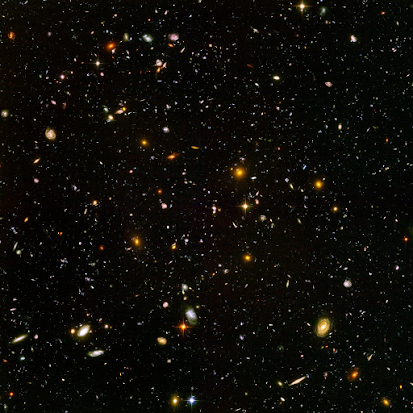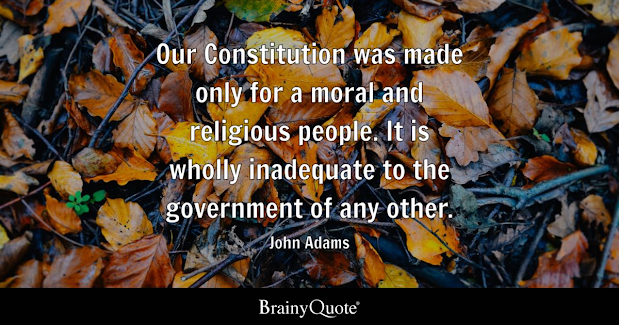I believe I read this book in the early to mid 1980's. It was before I marked up my books, and it was pre-Internet, blogs and such ... I was too lazy to take notes.
I was in my questioning everything phase at that time. Being raised in a fundamentalist Baptist church ... no dancing, no drinking, no movies, no smoking, etc, I started to look at Christianity as "the religion of don'ts". Possibly, "You shall know them by what they DON'T do!" would have been a good creed for that particular sect. They were certainly not "creedal" ... we didn't even learn the Lord's Prayer. That was something the supposedly Satanic Catholics learned! If the Catholics did it, we DIDN'T!
I loved my parents and I loved a lot of people in that church ... this was fortunately not the age of "cancelling", although my first "love" relationship was cancelled by a Catholic dad. We were not THAT serious, but he wasn't taking any chances!
Thinking of this time made me think of a favorite Professor, Richard DeGrood who I took a philosophy class from. He worked fairly hard for me to change my major to philosophy. I sometimes wonder what might have been, rather than me being focused on climbing the corporate ladder and suppressing/denying my anxiety and depression.
I found this review, that at least gives some pointers and a very top level summary of the book.
It is a very popular book, probably mostly because it is "relatively short" (495 pages) for a book of this scope, and written in a style that is easy to follow and as entertaining as this sort of book can be.
On page 100, he talks of a subject near and dear to my heart ... "What does it MEAN!", a concern shared by Origen (one of the church fathers) ..."He held that there are three levels of meaning in the Bible: the literal sense, the moral application to the soul; and the allegorical or spiritual sense, which refers to the mysteries of the Christian faith".
I suspect that there are a LOT more than "three levels" ... for one, there is the fact that it was written at the first level from either inspiration, eye witness, or second/third/?? hand. For those of us living today, it was translated, (maybe multiple times), it is "contextualized" both in terms of the culture at the time it was written/translated as well as in the context of how we think today. While we believe in "God with us" through the Holy Spirit, believers need a lot of grace to connect with Christ through the Bible and church. All of the authors, copyists, translators, etc, also needed a lot of help from the Holy Spirit.
We don't tend to think about our thinking (epistemology). Often there are many levels between what is "seen" or "inspired" and what is written, translated, interpreted, etc. As humans, we deeply want to put our hand into the side of the risen savior like Thomas, but in John 20:29 "Jesus saith unto him, Thomas, because thou hast seen me, thou hast believed: blessed are they that have not seen, and yet have believed." We are commanded to believe without anything close to direct sight or touch ... in fact, other than the Holy Spirit (which must be our guide), we are asked to believe through writings that are thousands of years old and have been translated a number of times.
We clearly NEED the Holy Spirit, and it would be nice if our pastors/teachers in the here and now, understood that it ISN'T "as plain as the nose on your face". We protestants don't take Matthew 16:18 literally. "And I tell you that you are Peter, and on this rock I will build my church, and the gates of Hades will not overcome it." We choose to take what was said in verse 16 "Simon Peter answered, “You are the Christ, the Son of the living God.”" ... Peter's confession, as the real foundation of the church. (while Catholics take the literal text)
As a lapsed Baptist and a student of history, I hungered for as much historical connection to the truth of the Christian doctrine as I could find ... which I assumed meant Catholicism, because that is what it was sold as, AND because it had withstood the test of time. Without the Catholic Church (and no doubt God's protection of it), we would not be discussing this today. It is a bit amazing that I never joined the Catholic Church, or actually read this book with a bit more rigor. On page 380, it covers the doctrine of papal infallibility ... which became a dogma in 1870 because the church was no longer superior to the state -- the church was in dire need of authority. Infallibility met that need. On December 8, 1854, Pious IX declared the dogma of the immaculate conception ... that MARY was conceived without sin.
Once you are "infallible", you can declare a lot of things. As a Christian, I dearly hope that the Pope will never declare gay "marriage" as a proper sacrament. It would not change my belief, but looking at Vatican II, I have to assume a lot of Catholics would follow that teaching.
As a person who really thinks that the 18 year old Scotch is better than the stuff that just dribbled out of the still, tradition matters to me. "New and improved" sounds more like marketing than theology. Tradition matters, but it isn't all that matters.
While we are at it, how about praying to Mary? The earliest reference is the "Sub tuum praesidium" 259 AD, so not exactly "new". In the catholic. (universal) church, the saints are with us at least as we take Holy Communion ... so Mary and the other saints are more "alive" than we are. We often ask other Christians to pray for us, and since Mary is certainly alive in Heaven, and revered among all women, it doesn't seem "wrong" to ask her to pray for us. The danger is that while it isn't likely that we will be tempted to worship any Tom, Dick, or Harry that we ask to pray for us, the same is not true of Mary. Be not drunk as to wine, nor of Mary.
On page 456, Shelly declares relative to the 18th amendment; "This was probably the last successful evangelical crusade for a moral America". Given Christ's first miracle at Cana, I'm not sure that the 18th had murch to do with actual morality, but "whatever".
On 460, he gets into a discussion about how some claimed that more "born again" Christians would improve the morality of America. Arthur Schlesinger jr had declared of Jimmy Carter that he thought Carter ought not have brought up his "born again" religion in the campaign, stating "If you feel that, then bully for you, but it is totally irrelevant". Looking around today, it seems pretty obvious that being short on Christians is a bad thing for a culture.
I would argue that Dobbs is a good example of a cultural victory involving Christians of both Catholic and Evangelical types, with the credit, as always, being God's.
It isn't at all clear that Christ much improved the general public morality of the Jews, nor the Roman Empire until maybe Constantine (got rid of burning Christians for light and gladiators) if ever. Christ declared that his kingdom was NOT of this world. The Middle Ages, when the Church largely WAS the State, are not seen as particularly moral by Biblical standards.
The end of the book drifts off into the "social gospel" and the idea that unity is more important than theology, or truth for that matter. On page 468 we see; "Through all these years, the most persistent critics of conciliar ecumenism were the conservative Evangelicals. Holding staunchly to the authority of the Bible, Evangelicals know that Jesus prayed that his disciples would be one, but they question the federation form of Christian unity".
UNLESS there is at least significant agreement on the authority of the Bible for more than just a couple quotes taken out of context, any idea of "Christian unity" is foolishness. If everyone would just agree with ME, we could be unified! It reminds me of Biden claiming he came to "heal" when what he really meant was HEEL! If you deplorable ultra MAGA, racist, fascist, uneducated scum would just HEEL, the divisions would end. Heil Biden!
The imagined "unity" in the middle ages was achieved through the power of the state and the church being combined. Thousands were slaughtered, burned, tortured, etc so that "unity" could be achieved. The price of that sort of "unity" seems too high to me if it is achieved via either the church, the state, or a partnership.
I dearly desire much more unity among Christians. Certainly we have doctrinal differences, but it seems that at least those of us who attempt to accept the Bible as the word of God, believe in Christ born of the Virgin Mary, crucified for our sins, and saving us through that sacrifice, could be unified in at least as much love as we are commanded to have for even our enemies!


